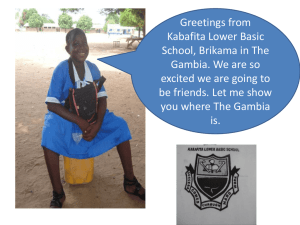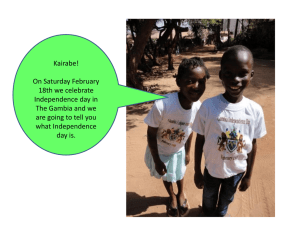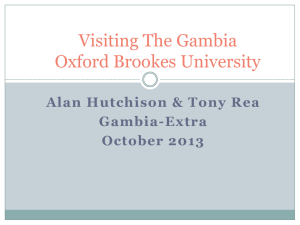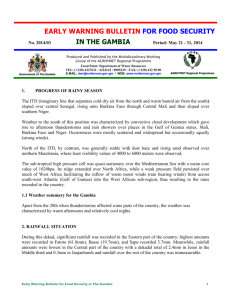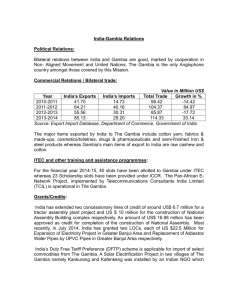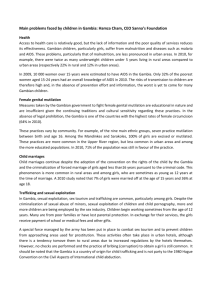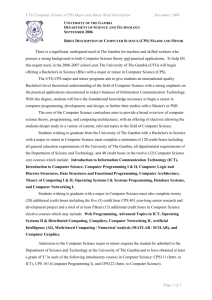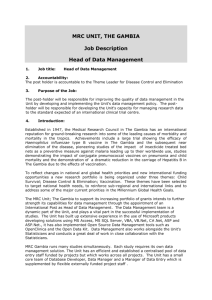The Gambia
advertisement
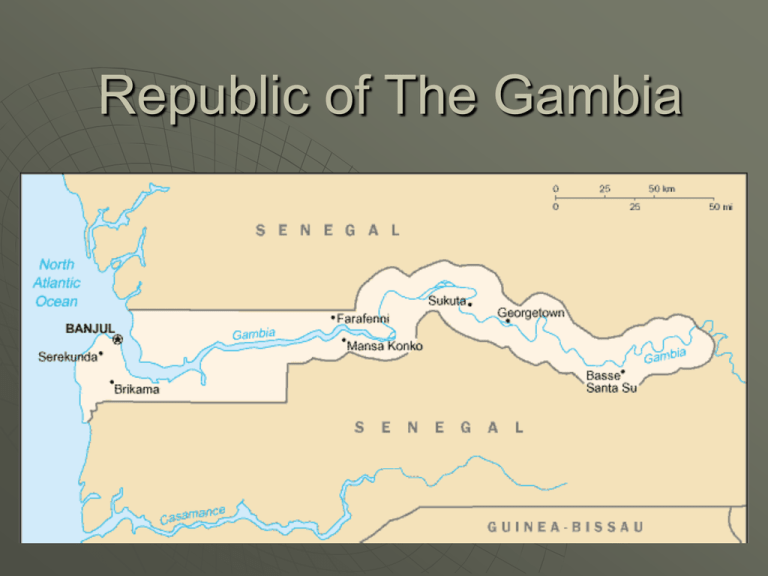
Republic of The Gambia The History of The Gambia The first written accounts of this region came in the 9th and 10th centuries by Arab traders. These Arab traders established the trans-Saharan trade route for slaves, gold, and ivory. The area has also been taken over by the Portuguese for the use of trade. The English bought the exclusive trade rights to the region but eventually helped in the fight against the slave trades. In 1888, The Gambia became a separate colonial entity from Britain. More History In 1906, Slavery was abolished in The Gambia During WWII Gambian troops fought with the allies, and North American’s even used Gambia as a port of call and air stop. President Franklin Roosevelt even spent the night in Banjul on his way to a conference in 1943, making it the first visit to Africa by an American President. In 1962 full self government was granted to The Gambia. History Cont. The Gambia gained its independence from the UK in 1965. In 1970, The Gambia became a republic instead of the traditional Monarchy. In 1991, after a short lived federation with Senegal, the two countries signed a friendship and cooperation treaty. In 1994 a military coup resulted in banned political activity and an overthrown president. In 1996 a new constitution was drafted and presidential elections were held. Government The government is divided into 1 city and 5 divisions. Banjul is the capital of The Gambia. 5 divisions: Lower River, Central River, North Bank, Upper River, Western. The Gambia, a multi-party republic within the Commonwealth, is administered by an Executive President Elections are held every 5 years through secret ballots to elect candidates the the house of parliament A new constitution was put into place in 1996. This constitution better protects the rights of the people and provides the government with a strong presidential power, a unicameral legislature, and an independent judiciary. Economy Gambia is predominantly an agricultural country. Unlike the U.S. who is predominantly industrial. Exporting peanuts were the main source of income (accounted for over 81%), until the government contributed to losing the largest purchaser. (By seizing the private peanut firm) Gambia’s leading trading partners are China, Japan, and Senegal Pre-shipment inspections and currency has deterred much of the trade Until a recent military takeover, Tourism contributed to 60 % of their Gross Domestic Products. Gambia has no significant natural resources or minerals. Gambian Greeting & Culture Greetings key to successful interaction with Gambians at every level (market, street, office, or phone) Greeting acknowledges existence of another human being taking the time to relate to him or her in a personal way is priority in Gambian society helping to achieve the goal of harmony and peace Expected to greet every member of the community regardless of status or wealth; it shows respect and every member has an important role to fulfill. Gambian Greeting & Culture Shaking hands (right hand) is part of the greeting process; people shake hands as often as they see each other during different times of the day; women however are not normally expected to shake hands Greeting a group of people or someone from a distance, raising clasped hands takes place of the handshake When working or eating, the arm may be offered instead For greeting elders: a younger person greets an elder first and avoids direct eye contact Gambian Greeting & Culture Gambians express anger by refusing to greet the person; this is considered a great insult denoting a lack of respect Foreigners living in The Gambia must realize that they may hurt people’s feelings by not greeting every individual with whom they come in contact with even if it is during a business transaction Gambian Greeting & Culture In Gambia it is not necessary to be invited to eat at any meal. You are always welcome! They eat from a large communal bowl; men have one, women have one, and children have one It is considered polite to wash your hands and “taste” the food even if you don’t feel like eating. If you do not want to continue eating you should leave the eating area and wait until they are through as it is considered impolite to watch people eat Right hand is used for eating (you eat with bare hands) even if you are left handed; you may use the offered spoon but eating with your hands is done to “please” the host Gambian Greeting & Culture Talking while eating, especially by children, is suppressed because it is considered disrespectful to the food and is against certain superstitions It is not considered rude to belch; on the contrary it is an indication that you have eaten well and your host will be pleased. Gambian Greeting & Culture Clothes should cover most of the body and fit loosely so that they shape of the body is not revealed In urban areas European style clothing is commonly worn English is the official language used in schools, courts of law, and the administration; local languages are widely spoken also. Links http://www.cia.gov/cia/publications/factbo ok/geos/ga.html for economy. http://www.odci.gov/cia/publications/factb ook/geos/ga.html http://www.lonelyplanet.com/destinations /africa/gambia/culture.htm http://gambiainformation.atspace.com/ga mbia-government.html for government http://www.worldtraveltips.net/africa/view .cgi?country=Gambia this one has the thing about shaking hands.

